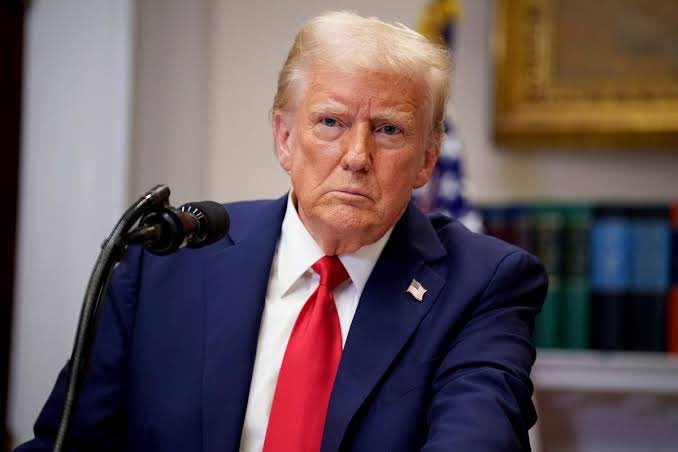Donald Trump threatens strict action against countries continuing to import Russian goods, signaling a hardline stance if re-elected in 2024.
In a fiery statement that has reignited tensions in global diplomacy, former U.S. President Donald Trump has made it clear: any country that continues to trade with Russia, especially by buying its exports, will face direct consequences if he returns to office. This bold declaration came during a political rally in Florida, where Trump addressed thousands of his supporters and spoke about his vision for restoring American global dominance.
Trump’s warning wasn’t vague. He pointed fingers at multiple U.S. allies and trade partners who continue to engage with Russia despite the ongoing conflict in Ukraine. “If you are buying oil, gas, weapons, or raw materials from Russia, you are funding war, and that will not be tolerated under my administration,” Trump said. “You will be sanctioned. You will be blocked. You will be stopped.”
This isn’t the first time Trump has embraced a combative trade stance. His presidency from 2016 to 2020 was marked by economic sanctions, trade tariffs, and a strong-arm approach to foreign policy. But what makes this new threat significant is its timing and context—Russia is under a heavy Western sanctions regime due to its war in Ukraine, yet continues to export energy and resources to countries like India, China, Brazil, South Africa, and several Southeast Asian nations.
Trump emphasized that economic cooperation with Russia is enabling Putin to sustain his war machine and promised that if elected again, he would “cut off the oxygen” to nations that keep Moscow afloat through trade. While he did not name specific countries, it was clear that nations maintaining strong economic ties with Russia could be in his crosshairs.
The former president also hinted at creating a global coalition to isolate Russia further and penalize countries that refuse to comply. He mentioned pushing for new international trade rules that “punish the enablers”—those who, according to him, undermine U.S. leadership and empower America’s adversaries through commerce.
Naturally, this stance could have wide-ranging implications. Many emerging economies rely on affordable Russian exports—especially oil and wheat—to manage inflation and stabilize their own domestic markets. For example, India continues to import discounted Russian crude, while China has expanded energy and infrastructure deals with Moscow.
Trump’s warning also raises concerns about how far the U.S. is willing to go under his potential future leadership. Would America impose secondary sanctions on allies? Would it withdraw aid or trade agreements from long-time partners? The global economic ripple effect could be massive.
Several analysts have noted that Trump’s aggressive stance could divide international alliances, especially those in Asia and the Middle East. A former U.S. diplomat remarked, “He’s not just threatening Russia anymore. He’s threatening anyone who doesn’t follow his lead. That’s not diplomacy—that’s economic warfare.”
On the other hand, some of Trump’s supporters argue that this is the decisive leadership the West needs to dismantle Russia’s economic strength and bring an end to the Ukraine conflict. “If you really want to win, you have to go after everyone who’s keeping Putin in business,” one conservative think tank official commented.
Critics, however, say that Trump’s strategy is simplistic and dangerously provocative. By alienating countries that are currently neutral or non-aligned, the U.S. risks pushing them further toward authoritarian blocs like BRICS or SCO (Shanghai Cooperation Organization). Moreover, these countries may see Trump’s threats as a form of neo-colonial pressure, resenting being told who they can or cannot trade with.
The Biden administration has taken a more measured approach—relying on diplomatic channels and existing sanctions to pressure Russia. However, Trump’s potential return could radically shift the U.S. foreign policy from balanced restraint to outright confrontation.
Markets, too, may react. A global trade disruption—particularly involving energy, fertilizer, and wheat—could send commodity prices soaring, destabilizing both developed and developing economies. Businesses engaged in global trade are already on edge, with several multinational corporations reconsidering their positions in countries that maintain strong Russian ties.
As expected, the Kremlin brushed off Trump’s remarks. A spokesperson from Moscow said, “Russia does not conduct its international trade on the basis of threats. We are used to such rhetoric from the previous Trump administration.”
Meanwhile, countries like India and China have maintained strategic silence, likely assessing the situation carefully. Both nations have stressed in recent months that their foreign policy remains independent and based on their own national interests—not pressure from the West.
The real question remains: Is this just campaign rhetoric or a preview of Trump’s second-term foreign policy? Only time will tell. But one thing is certain—Trump’s words have already set off alarm bells across diplomatic and trade circles worldwide.

